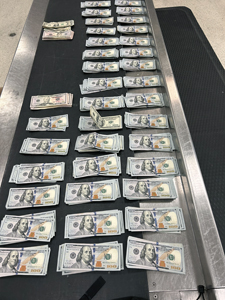PHILADELPHIA – We’re in the middle of a busy summer travel season and before you go on that long-awaited international trip, U.S. Customs and Border Protection wants to share the most import tip that can help you save time and money – be truthful during your inspection with a CBP officer. A Columbus, Ohio man learned that lesson on Sunday at Philadelphia International Airport.
CBP officers randomly selected the U.S. citizen for a secondary examination after he arrived from Beirut, Lebanon through Paris, France. During that examination, the traveler acknowledged that he understood the United States currency reporting law and then declared verbally and in writing that he possessed $15,000.
There is no limit to how much currency or other monetary instruments travelers may bring to or take out of the United States. However, federal law [31 USC 5316] requires travelers to report all currency of $10,000 or greater to a CBP officer and complete U.S. Treasury Department Report of International Transportation of Currency or Monetary Instruments [pdf: FINCEN 105]. Travelers can get an early start on reporting their currency by completing a guided FINCEN 105 form on CBP’s website prior to a CBP arrivals inspection or departure inspections.
Officers conducted a baggage examination and in total counted $36,834 in the traveler’s possession. Officers seized the total $36,834 for violating currency reporting laws. Officers then remitted $834 to the man as a humanitarian relief and released him to continue his travel.
CBP is not releasing the travelers name because he was not criminally charged.
“Customs and Border Protection officers always allow travelers multiple opportunities to truthfully report all of the currency in their possession, and most people are 100% honest with us,” said Adam Streetman, CBP’s Acting Area Port Director for the Area Port of Philadelphia. “But sometimes we encounter travelers who disregard our nation’s laws and get to experience how severe the consequences can be. The easiest way to keep your money is to truthfully report it all to a CBP officer.”
In addition to having their currency seized, travelers risk other consequences, such as missing their departure or connecting flight, interrupting vacation plans, or facing potential criminal prosecution.
CBP officers know that smuggled currency may sometimes be the proceeds of illegal activity, such as financial fraud and money scams, and so officers routinely inspect passengers on arriving and departing international flights to verify compliance with currency and other laws.
CBP officers and agents seized an average of about $183,000 in unreported or illicit currency every day last year at our nation’s international ports of entry and along our nation’s borders.
CBP encourages travelers to Know Before You Go on your next international trip by reading our Top-10 Travel Tips and learn which items are Prohibited and Restricted from bringing back to the United States.
CBP's border security mission is led at our nation’s Ports of Entry by CBP officers and agriculture specialists from the Office of Field Operations. CBP screens international travelers and cargo and searches for illicit narcotics, unreported currency, weapons, counterfeit consumer goods, prohibited agriculture, invasive weeds and pests, and other illicit products that could potentially harm the American public, U.S. businesses, and our nation’s safety and economic vitality.
See what CBP accomplished during "A Typical Day" in 2023. Learn more at www.CBP.gov.
Follow the Director of CBP’s Baltimore Field Office on X (formerly Twitter) at @DFOBaltimore for breaking news, current events, human interest stories and photos, and CBP’s Office of Field Operations on Instagram at @cbpfieldops.


